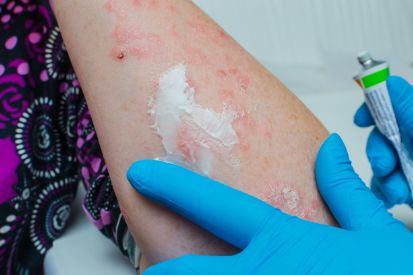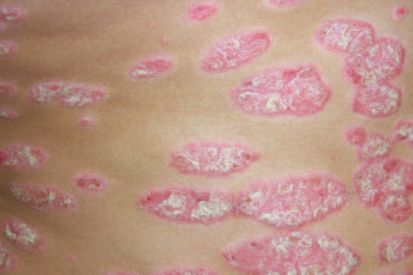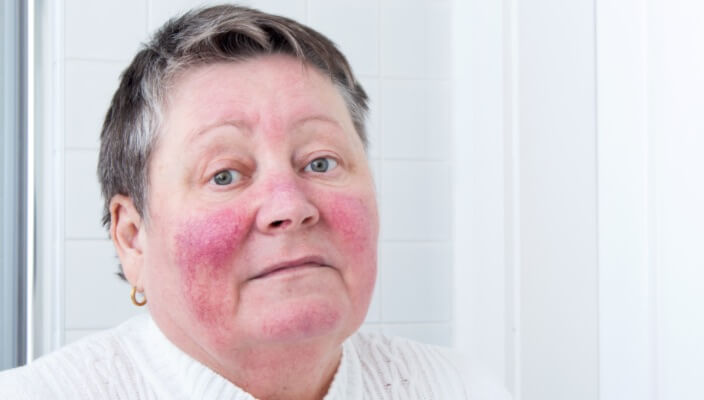Psoriasis
Comprehensive Psoriasis Care at Keystone Dermatology Partners
Psoriasis is a chronic, non-contagious skin condition that results from an immune system abnormality, causing the rapid overproduction of new skin cells. When the skin cannot shed these old cells quickly enough, dead cells build up on the surface, leading to the thick, scaly patches characteristic of psoriasis.
Psoriasis presents in various forms, each with distinct features:
Plaque Psoriasis: The most common type, appearing as red or pink patches with a silvery scale. It frequently affects the scalp, elbows, knees, hands, and feet, but can also appear on any skin surface, including the nails.
Guttate Psoriasis: Often seen in children but also present in adults, this type typically emerges after an illness like strep throat. It is marked by small, drop-like lesions scattered across the skin.
Pustular Psoriasis: Characterized by blister-like, pus-filled lesions surrounded by red skin. This form usually affects the hands and feet but can develop on other parts of the body.
Inverse Psoriasis: Occurs in skin folds, such as the armpits, groin, and under the breasts, and presents as smooth, red, inflamed patches.
Psoriasis affects about 4.5 million Americans each year and is slightly more common in women. Managing psoriasis can be challenging due to its unpredictable nature, but at Keystone Dermatology Partners, we provide a variety of tailored treatment options to help you manage this condition effectively.
Whether you experience mild symptoms or more severe manifestations, our team at Keystone Dermatology Partners is committed to supporting you in maintaining your skin health and enhancing your quality of life. Schedule an appointment to explore how we can help you navigate your psoriasis journey.
Examples of Psoriasis



What are the Symptoms of Psoriasis?
- Red, inflamed skin.
- Silvery-white scales.
- Itching or burning sensation.
- Dry, cracked skin.
- Thickened or pitted nails.
- Joint pain and swelling in some cases.
What Causes Psoriasis?
- Genetic factors: Psoriasis often runs in families, suggesting a genetic predisposition to the condition.
- Immune system dysfunction: Abnormalities in the immune system can lead to an overactive response, triggering rapid skin cell growth.
- Other health conditions: Psoriasis is associated with an increased risk of other health issues such as cardiovascular disease, diabetes, and certain autoimmune disorders.
How to Prevent Psoriasis
Psoriasis FAQs:
Psoriasis is a chronic condition, meaning it doesn't have a cure. However, it can be managed effectively with treatments and lifestyle adjustments.
Weather can impact psoriasis, with some people experiencing flare-ups in certain conditions. Cold, dry weather can be harsh on the skin. Moisturizing regularly and adapting your skincare routine can help.
While it's possible, it's essential to take extra precautions. Psoriasis can affect how your skin reacts to tattoos, and flare-ups can complicate the healing process. Consulting with your dermatologist before getting a tattoo or piercing is advisable.
Stress is known to trigger or worsen psoriasis flare-ups. Finding effective stress management techniques, such as exercise, meditation, or hobbies, can be beneficial.
No, psoriasis is not contagious. It's an immune system-related condition, not an infection.
From our QualDerm Family of Brands: Learn More About Psoriasis
Psoriasis Treatments
- Oral and injectable medications that affect the immune system to control the psoriasis.
- Tight therapy treatment.
- Laser treatment and more.
Our dermatologists tailor treatment plans to individual needs, emphasizing a balance between managing symptoms and minimizing potential side effects. Regular monitoring and follow-ups with our team of skin experts are crucial for effective psoriasis management and to develop a health skin routine for years to come.
Featured Blogs

- General Dermatology
- Skin Care
Rosacea is a common skin condition characterized by facial redness and pimples. A recent study suggests that drinking caffeinated coffee may reduce the risk of developing rosacea, highlighting a potential benefit of coffee consumption.
Read More
- General Dermatology
- Chronic Skin Conditions
Discover how a dermatologist father identified and managed molluscum contagiosum, a common and benign skin infection, after noticing skin-colored bumps on his son.
Read More
- General Dermatology
Almost everyone experiences itchy skin at some point. Read this blog to learn how a dermatologist can help.
Read More

